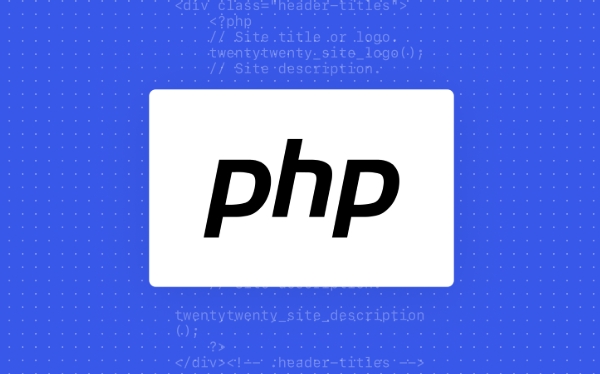The Security Risks of Unchecked Global State via $GLOBALS
Aug 03, 2025 pm 04:20 PMUnchecked use of $GLOBALS allows unintended variable overwriting, enabling attackers to manipulate critical data like user IDs or roles without validation; 2. It increases the attack surface by breaking encapsulation, making functions dependent on mutable global state that can be exploited to bypass security checks; 3. Tracking state changes becomes extremely difficult, complicating audits and hiding unauthorized or accidental modifications; 4. Poor input handling, such as injecting $_GET keys into $GLOBALS, can directly lead to privilege escalation. To mitigate risks: avoid $GLOBALS in application logic, use dependency injection and function parameters instead, always validate and sanitize input, never store sensitive data in global variables, use immutable configuration objects, enforce strict coding standards with tools like PHPStan, and disable dangerous functions like extract() in production. Relying on $GLOBALS for state management undermines security and maintainability, so its use should be minimized and treated as a red flag in code reviews—just because PHP allows global variable manipulation does not mean it should be used.

Using PHP’s $GLOBALS superglobal to access or manipulate variables across different scopes might seem convenient, but it introduces significant security risks when used without proper control—especially when global state is modified unchecked. While $GLOBALS itself is not inherently dangerous, its misuse can compromise application integrity, lead to unexpected behavior, and open doors to vulnerabilities.

Here’s why unchecked global state via $GLOBALS is a security concern and how to mitigate the risks.
1. Unintended Variable Overwriting
$GLOBALS provides read-write access to all variables in the global scope. This means any part of the code—intentionally or accidentally—can modify a global variable.

For example:
$GLOBALS['user_id'] = 123;
function processInput($input) {
$GLOBALS['user_id'] = $input; // No validation!
}
processInput($_GET['id']); // Attacker controls inputIf user input is written directly into a global variable like user_id without validation or sanitization, an attacker could escalate privileges by setting id=1 (e.g., impersonating an admin).

The risk: Critical data stored globally becomes mutable from anywhere, including insecure or untrusted code paths.
2. Increased Attack Surface and Poor Encapsulation
When functions rely on global variables via $GLOBALS, they become tightly coupled to the global state. This breaks encapsulation and makes code harder to audit, test, and secure.
Consider:
function deleteAccount() {
if ($GLOBALS['user_role'] === 'admin') {
// delete logic
}
}An attacker who finds a way to inject or alter $GLOBALS['user_role'] (e.g., through dynamic variable assignment or insecure extract() calls) could bypass authorization.
The issue: Security decisions based on global state are fragile because that state can be modified outside the intended flow.
3. Difficulty in Tracking and Auditing State Changes
Because $GLOBALS is accessible everywhere, tracking where a variable was changed requires scanning the entire codebase. This makes it hard to detect:
- Unauthorized modifications
- Accidental overwrites
- Injection points
During security audits, this obscurity can hide critical flaws.
4. Exploitation via Dynamic Code or Poor Input Handling
Some older or poorly written PHP code uses constructs like extract($_GET) or dynamic variable names ($$key = $value), which can pollute or manipulate the global scope—including entries in $GLOBALS.
Example:
foreach ($_GET as $key => $value) {
$GLOBALS[$key] = $value; // Direct injection into global state
}An attacker could send ?user_role=admin and elevate privileges if that variable is later trusted.
Best Practices to Reduce Risk
To avoid the pitfalls of unchecked global state:
-
Avoid using
$GLOBALSfor application logic. Use dependency injection, function parameters, or configuration objects instead. - Validate and sanitize any input before it influences state—even if indirectly.
- Never store sensitive or security-critical data (like roles, tokens, or session flags) in global variables.
-
Use
readonlyclasses or configuration objects in modern PHP to enforce immutability. - Enable strict coding standards and static analysis tools (like PHPStan or Psalm) to detect risky global usage.
-
Disable dangerous functions like
extract()andcompact()in production environments when not absolutely necessary.
Conclusion
$GLOBALS is a powerful tool for debugging or very specific legacy use cases, but relying on it for state management introduces serious security and maintenance issues. Unchecked access to global variables enables logic flaws, privilege escalation, and difficult-to-trace bugs.
The key is to minimize reliance on global state and treat any use of $GLOBALS as a red flag during code reviews. Modern PHP applications should favor encapsulated, predictable data flow over convenience-driven global access.
Basically: just because you can change any variable from anywhere doesn’t mean you should.
The above is the detailed content of The Security Risks of Unchecked Global State via $GLOBALS. For more information, please follow other related articles on the PHP Chinese website!

Hot AI Tools

Undress AI Tool
Undress images for free

Undresser.AI Undress
AI-powered app for creating realistic nude photos

AI Clothes Remover
Online AI tool for removing clothes from photos.

Clothoff.io
AI clothes remover

Video Face Swap
Swap faces in any video effortlessly with our completely free AI face swap tool!

Hot Article

Hot Tools

Notepad++7.3.1
Easy-to-use and free code editor

SublimeText3 Chinese version
Chinese version, very easy to use

Zend Studio 13.0.1
Powerful PHP integrated development environment

Dreamweaver CS6
Visual web development tools

SublimeText3 Mac version
God-level code editing software (SublimeText3)
 Dependency Injection: The Superior Alternative to $GLOBALS
Aug 03, 2025 pm 03:56 PM
Dependency Injection: The Superior Alternative to $GLOBALS
Aug 03, 2025 pm 03:56 PM
Dependencyinjection(DI)issuperiortousing$GLOBALSbecauseitmakesdependenciesexplicit,whereas$GLOBALShidesthem.2.DIimprovestestabilitybyallowingeasymockingofdependencies,unlike$GLOBALSwhichrequiresmanipulatingglobalstate.3.DIreducestightcouplingbydecoup
 The Security Risks of Unchecked Global State via $GLOBALS
Aug 03, 2025 pm 04:20 PM
The Security Risks of Unchecked Global State via $GLOBALS
Aug 03, 2025 pm 04:20 PM
Uncheckeduseof$GLOBALSallowsunintendedvariableoverwriting,enablingattackerstomanipulatecriticaldatalikeuserIDsorroleswithoutvalidation;2.Itincreasestheattacksurfacebybreakingencapsulation,makingfunctionsdependentonmutableglobalstatethatcanbeexploited
 The Perils of Global State: Why You Should Avoid PHP's $GLOBALS
Aug 03, 2025 am 04:14 AM
The Perils of Global State: Why You Should Avoid PHP's $GLOBALS
Aug 03, 2025 am 04:14 AM
Using$GLOBALScreateshiddendependencies,makingfunctionshardertotest,fragile,andunreusable;2.Itcomplicatesunittestingbyrequiringglobalstatemanipulation,leadingtoslow,fragiletests;3.Globalstateisunpredictableduetouncontrolledmodifications,causingbugsand
 Refactoring Legacy PHP: A Practical Guide to Eliminating $GLOBALS
Aug 03, 2025 am 11:14 AM
Refactoring Legacy PHP: A Practical Guide to Eliminating $GLOBALS
Aug 03, 2025 am 11:14 AM
To eliminate $GLOBALS in PHP, it should first analyze its usage and then replace global variables with dependency injection, configuring objects, and step-by-step refactoring. 1. Use grep and other tools to find out all the usage of $GLOBALS and record the key names and locations; 2. Replace global variables such as database connections and configurations with explicit dependencies, such as injecting PDO or Config objects through constructors; 3. Create service classes (such as Logger, UserService) to encapsulate functions to avoid function dependence on global state; 4. Centrally manage the configuration, load from the configuration file returning the array, and inject the required classes; 5. Reconstruct the database in a small way, replacing a $GLOBALS reference at a time, and test to ensure consistent behavior; 6. Beware of including
 Navigating the Minefield: Legitimate (and Rare) Use Cases for $GLOBALS
Aug 04, 2025 pm 02:10 PM
Navigating the Minefield: Legitimate (and Rare) Use Cases for $GLOBALS
Aug 04, 2025 pm 02:10 PM
Using$GLOBALSmaybeacceptableinlegacysystemslikeWordPresspluginswhereitensurescompatibility,2.Itcanbeusedtemporarilyduringbootstrappingbeforedependencyinjectionisavailable,3.Itissuitableforread-onlydebuggingtoolsindevelopmentenvironments.Despitethesec
 Debugging Global State Chaos Caused by $GLOBALS Manipulation
Aug 03, 2025 pm 01:46 PM
Debugging Global State Chaos Caused by $GLOBALS Manipulation
Aug 03, 2025 pm 01:46 PM
$GLOBALSmanipulationcancauseunpredictablebugsinPHP;todebugandresolveit,1.Understandthat$GLOBALSprovidesglobalaccesstoallvariables,makingstatechangeshardtotrack;2.DetectunwantedmodificationsusingstrategicdebugloggingandaGlobalsWatcherclasstosnapshotan
 $GLOBALS: A Historical Relic or a Misunderstood Tool?
Aug 03, 2025 pm 02:31 PM
$GLOBALS: A Historical Relic or a Misunderstood Tool?
Aug 03, 2025 pm 02:31 PM
$GLOBALSisnotinherentlybad;itisatoolwhosevaluedependsonitsuse.Itisanassociativearrayprovidingaccesstoallglobalvariables,allowingfunctionstoreadglobalvariableswithouttheglobalkeyword.Itsnegativereputationstemsfromencouragingglobalstate,obscuringdepend
 Analyzing the Performance Overhead of the $GLOBALS Superglobal
Aug 03, 2025 am 09:16 AM
Analyzing the Performance Overhead of the $GLOBALS Superglobal
Aug 03, 2025 am 09:16 AM
Theperformanceoverheadof$GLOBALSisminimalinmostcasesbutcanbecomesignificantinhigh-frequencyfunctionsorlong-runningscripts;1.$GLOBALScreatessymboltableandmemoryoverheadbymirroringallglobalvariables;2.Arrayaccessvia$GLOBALS['var']isslowerthandirectvari






